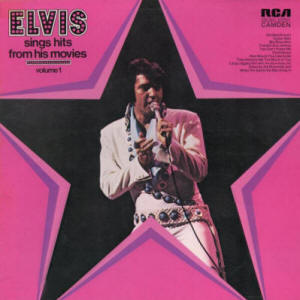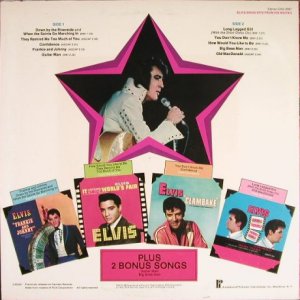

In early June 1972 CAMDEN released "Elvis
Sings Hits From His Movies - Volume 1". With
sales of 130,000 copies the album entered the
"Top LPs Chart" on July 8th, had a run of 15
weeks and peaked at number 87. This was caused
by the low price. To avoid "bought" chart
successes by price dumping, Billboard calculated
the charts by using the value in USD. In
contrast to the magazine the RIAA honored the
sold copies and awarded "Elvis Sings Hits From
His Movies - Volume 1" with Platinum (2004).
Outside of the US the compilation was also
received well, worldwide CAMDEN sold two million
units. Translated to the present this amount of
physical sales equals 300 million paid streams
of the album or 3 billion paid streams of
individual tracks. Therefore this collection of
old movie tunes moved twice as much copies as
"Elvis Now", the current studio album of the
king.
Because the material is available elsewhere
Sony Music Entertainment hasn't released a
digital version of "Elvis Sings Hits From His
Movies - Volume 1".
The cover of the aforementioned longplayer
had featured a photo taken during the "Elvis
Summer Festival 1971" in Las Vegas. CAMDEN used
a picture from the same show to give the
collection of old tracks a current touch. On the
backside the label used a concert picture from
November 1970 and also showed the covers of the
albums the songs on this compilation were taken
from.
Back in 1972 the situation was different.
There was no streaming and all the music had to
be made available on physical sound carriers. If
the sales were low, the records were not
profitable and the labels stopped the
production. CAMDEN made use of the situation and
made some of the tracks available again. The
concept of this compilation was to collect
songs, that either had been released on singles
or were based on popular melodies. The album
also contained bonus songs, which have no
connection to any movie, but they had been
released as bonus songs on the original
soundtrack albums. All that doesn't turn the
tunes into hits, but never mind some marketing
scam.
The basis for this release was a new contract
with CAMDEN, that Elvis had signed in March
1972. Until the end of the year the label was
entitled to release another three budget albums.
The company granted an advance-payment of
180,000 USD (using the rough factor of 15 it
would be around 2.7 million USD today), to be
split 50/50 between the king and his manager.
Down By The Riverside / When The Saints
Go Marchin' InThe medley is supposed
to have been written by Bill Giant, Bernie Baum
and Florence Kaye, but of course it is nothing
but a combination of two traditionals that
simply were re-worked to create a new song in
the legal sense. "Down By The Riverside" was
originally sung by slaves at the time of the
civil war and was also known as "Ain't Gonna
Study War No More" and "Gonna Lay Down My
Burden". The first known recording was made by
The Fisk Jubilee Singers in 1920. "When The
Saints Go Marchin' In" became popular as a
funeral march in the southern states of the USA,
but its origins go back to a Belgian chant. Once
again the music track was recorded on May 12,
1965 and the vocal track followed a day later.
The master is a combination of take 7 (music
track) and take 4 (vocal track). The first
release was in 1966 on the soundtrack album
"Frankie And Johnny".
They Remind Me Too Much Of You
Elvis recorded this beautiful ballad on
September 22, 1962, take nine was chosen to be the master.
RCA Victor had released the song in 1963 on the
flipside of "One Broken Heart For Sale" and on
the album "It Happened At The World's Fair".
Just the previous year it had been re-released
on the boxed set "The Other
Sides - Worldwide Gold Award Hits Volume 2"
(1971). For Don Robertson, the writer of "They
Remind Me Too Much Of You", it turned out to be
a stroke of luck to have been booked as a
pianist for these sessions. Because suddenly
someone realized that the song was that similar
to "Chapel In The Moonlight", that there might
have been a copyright issue. Robertson could
save his song from being skipped by making some
adjustments. However, now it sounded very much
like "Anything That's Part Of You". But because
this one had also been written by Don, there was
no danger of being sued. To me this is a great
song which certainly wouldn't have been out of
place on a regular studio album of the king.
Confidence
In the movie "Clambake" Scott (Elvis)
notices a discouraged girl on a slide - no doubt
she needs confidence and it has to be given to
her with a song. The unmotivated and clumsy
performance of the king is topped off by an
embarrassing bunch of adults, that tries to
imitate a children's choir. Allegedly
"Confidence" was written by Sid Tepper and Roy
C. Bennet, but it's a plain copy of "High
Hopes".
The music was recorded on February 22nd, the
king's vocals followed the next day. On March
6th a vocal repair was recorded at Annex Studio,
on September 19th June Page, Priscilla Hubbard,
Dolores Edgin and Millie Kirkham faked the
children's voices.
Frankie And Johnny
The traditional from the 19th century was also
known as "Frankie And Albert". It exists in many
different versions, but they all have in common
that Frankie kills her lover Johnny (or Albert)
because of jealousy. In some versions she lands
in jail, in others she gets executed. Alex
Gottlieb, Fred Karger and Ben Weisman adapted
the traditional for Elvis, who recorded it on
May 14, 1965 within six takes. "Frankie And
Johnny" is one of my favorite movie tunes,
because it differs from the usual ones and is
performed very well. In 1966 RCA Victor released
the song on the album "Frankie And Johnny" (what
a surprise!) and on a single.
Guitar Man
"Guitar Man" was released on a single and as a
bonus song on the soundtrack album "Clambake". It was recorded on September 10, 1967.
Elvis taped 12 takes of the song by Jerry Reed,
who added his concise guitar play on the same
day. The narrator chronicles his career as a
musician and the king's enthusiasm for this song
is obvious.
For his tv special "SINGER presents Elvis" the
king recorded a separate version of this song,
which was featured on the long player "Elvis" in
1968.
Long Legged Girl (With The Short Dress
On)
The singer tells us about the hardships of his
search for the girl with the long legs and the
short frock. The rocking melody and the edgy
electric guitar were supposed to sound modern,
but still "Long Legged Girl (With The Short
Dress On)" never leaves the level of a mediocre
movie tune. Elvis recorded the
song on June 29, 1966 at the MGM Soundstage. The
fifth take became the master. RCA Victor
released the track in 1967 on a single and on
the album "Double Trouble". CAMDEN had used the
song before on the budget lp "Almost In Love",
but by 1972 that one was also out of print.
You Don't Know Me
The ballad was written by Cindy Walker and Eddy
Arnold, who also was the first to release "You
Don't Know Me". On February 21, 1967 Elvis
recorded twenty takes of the song, but the final
attempt was only used for the movie "Clambake". On
September 11th the king taped two more
performances, the record master was a splice of
the first attempt and the final bars of the
second one. Elvis performs "You Don't Know Me"
very well and it certainly wouldn't have been
out of place on a regular studio album. RCA Victor
also released the song on the flipside of "Big
Boss Man".
How Would You Like To Be
The king needed six takes
for the children's song when he recorded it on September
22, 1962. The composers are Ben Raleigh and Mark
Barkan. "How Would You Like To Be" first
appeared on the soundtrack album "It Happened At
The World's Fair", later it could also be found
on the b-side of "If Every Day Was Like
Christmas".
Big Boss Man
The song was written by Al Smith and Luther
Dixon and released by Jimmy Reed in 1960. Elvis
recorded his version on September 10, 1967
within eleven takes. The narrator confronts his
boss and tells him that he slave-drives him by
letting him work all around the clock. The king
sounds quite aressive and performs the r&b
styled number extremely well. The track was
released on a single and as a bonus song on the
"Clambake" soundtrack. For his television
special "SINGER presents Elvis" he re-recorded
"Big Boss Man" and also performed it during his
concerts from 1974 to 1977.
Old Mac Donald
The children's song is based on a title from
the opera "The Kingdom Of Birds", written in
1720. Later versions were "The Farm Yard, Or
The Merry Green Fields" (1908), Ohio (Old
Macdougal Had A Farm) (1917) and "Old
Missouri" (1922). The oldest known recording
was made in 1925 by The Sam Patterson Trio.
Here it was already named "Old Mac Donald
Had A Farm". Later the song was also
recorded by Frank Sinatra, Ella Fitzgerald
or Elvis Presley. He did it on June 29, 1966
at the MGM Soundstage. The master was a
combination of take 3 (rhythm track), take 7
(vocal track) and a vocal repair recorded on
June 30th. The tune was re-written by Randy
Starr, which legally created a new song that
could be published on its own. "Old Mac
Donald" was taken from the album "Double
Trouble".
Verdict
A cover of an old tune or the release on
a single doesn't turn a song into a hit and
Elvis doesn't always sound as motivated as
he should. But still "Elvis Sings Hits From
His Movies - Volume 1" includes some great
songs and is better than its reputation.

(C) RCA Records
/ CAMDEN
![]()

